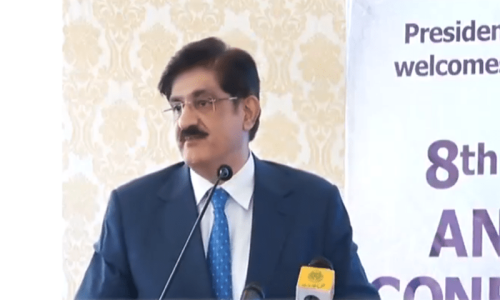KARACHI: When a few years back, research work on the 22-volume Urdu dictionary came to a successful end and its last volume was unveiled, officials of the Urdu Dictionary Board, despite the celebratory atmosphere, knew that the job was not yet finished, as the world of words is an infinite one and so is the scope of technological developments.
Urdu lexicographers are aware of the fact that we now live in a world where we meet people online, read books online and even take exams online.
Keeping in view the modern global trends in education, the board earlier this year announced that it would put on the Internet all the 22 volumes of the dictionary. The project was to go online in the month of May.
Highlighting the enormity of the task to Dawn, UDB’s chief editor Aqeel Abbas Jafri said: “There are 22 volumes carrying 22,000 pages and 264,000 words. We have decided to upload it on our website udb.gov.pk. The website wasn’t functional until recently. Now it’s up and running.
“It will have two features: one, the lughat [dictionary] will be accompanied by a search engine, that is, you can search for words individually and listen to their correct, or different versions of, pronunciation; two, we used to publish a journal Urdunama whose 54 editions were published. Their scanned editions will be available online as well. Apart from that, we have 1,500 rare books printed as far back as 1920 that we intend to scan and upload on a website like Rekhta’s. We have sent the proposal to the authorities concerned for that.
“Mind you, this online activity will benefit not only Pakistani readers but readers and lovers of the Urdu language all across the world.”
It all sounds good and ambitious but when is it going to happen? Mr Jafri said: “May 20 is our deadline. The reason for this is that all of it is being done properly. Tenders were invited through a transparent process. Tenders were submitted, bidding took place and the one with the lowest bid and the best profile got the job. Now in the first phase, the 22 volumes were composed. In the second phase, proofreading needed to be done. The software for the project was made word-wise, not volume-wise, so it took some time in developing the software. Bear in mind, in the published volumes quite a few entries of words were not correct and we need to revisit them. Here [online], unlike published works, we have that comfort to rectify mistakes.”
When did it actually all start? He said, “On Feb 7, the tender documents were completed after which it was decided that the project would be launched on May 20. Practically, the project began on March 1 and on May 5 the composing process was taken care of.”
Mr Jafri took charge of the board as its 15th chief editor on Dec 14 last year. The previous 14 editors included some of the giants of Urdu literature and language, the first one being none other than Baba-i-Urdu Maulvi Abdul Haq who held the post from 1958 to 1961. The first volume of the momentous dictionary was published in 1978 three decades after the board had been set up. It goes to show the kind of painstaking efforts made to put the volumes together. According to Mr Jafri, a great many words have been added ever since 1978, therefore, they need to be re-examined. But he also felt a little under constraint due to insufficient funds and the long process of getting things approved. When he assumed office, six of the 22 volumes were out of stock. Volume 14 has been published and work on the 15th is under way. The budget issues, he said, didn’t allow them to work as speedily as the board wanted.
Poet Liaquat Ali Asim, who once served in the board as a senior editor, welcomed the idea but highlighted the need that a great deal of caution (ahtiaat) should be exercised in putting things online. “The work related to the lughat is to do with research. These days the Internet is treated like a sanad (authentic source). I always say do not just pay heed to what’s being said but also pay attention to who’s saying it. I believe whatever has been published so far [volumes] they should transfer it as it is.”
Published in Dawn, May 14th, 2017















































Dear visitor, the comments section is undergoing an overhaul and will return soon.